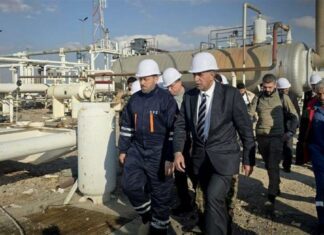
Israeli forces continue their incursions into Syrian territory, expanding their military presence in the buffer zone along the occupied Golan Heights in defiance of international law. The latest developments, including the destruction of civilian infrastructure and the arrest of residents, have intensified calls for Israel’s withdrawal, with UN officials stressing the urgency of ending the occupation.
Israeli Military Escalations in Quneitra
On Tuesday, Israeli forces reinforced their military positions in the Tal Ahmar area of Quneitra countryside, completing the lighting of a new military point. According to local sources, an Israeli force also entered the southern neighborhood of Al-Muallaqa, where soldiers patrolled for several hours before arresting a young man attempting to document the incursion.
Meanwhile, a partial withdrawal of Israeli forces was reported in certain areas of Quneitra, including the governorate building and courthouse, following more than 40 days of occupation. However, residents found the buildings vandalized, with destroyed files, burned computers and uprooted trees. The withdrawal of some forces does not negate Israel’s ongoing military presence in strategic locations, where new bases have been established.
A United Nations Disengagement Observer Force (UNDOF) delegation inspected the Quneitra Governorate building following the Israeli withdrawal, assessing the damage caused by the occupation forces. Activists warn that despite international scrutiny, Israel continues to assert control over key locations, in violation of the 1974 disengagement agreement.
Targeting Civilians Under Pretext of Security Operations
Israeli forces have continued raids under the justification of searching for alleged Hezbollah operatives, an accusation activists dismiss as a pretext for further territorial expansion. Yesterday, troops stormed homes in Al-Muallaqa, interrogating residents and arresting individuals without legal justification. A similar operation occurred in early January, with no evidence presented for the alleged security threat.
Kamal Bakr, a local activist, condemned Israel’s claims, stating, “The Israeli occupation is trying to legitimize its violations by spreading lies about the presence of Hezbollah remnants in the region. They ignore UN resolutions and continue their aggression despite international warnings.”
Israeli forces also detained individuals from the town of Taranja under the claim of their affiliation with an unknown group they have called the “Islamic Resistance in Syria.” Reports indicate that arbitrary arrests and military patrols have left civilians in constant fear of further incursions.
UN Calls for Israeli Withdrawal
UN Under-Secretary-General for Peace Operations Jean-Pierre Lacroix, who recently visited the region, reiterated that Israel’s occupation of Syrian territory is a direct violation of the 1974 disengagement agreement.
“The sooner Israel’s military presence in Syria ends, the better,” Lacroix said at a press conference at UN headquarters in New York. “This presence complicates the mission of UN observers and remains a clear violation of international law.”
Despite repeated UN condemnations, Israel has expanded its occupation, particularly in the buffer zone of Mount Hermon, using the fall of Bashar al-Assad’s regime as an opportunity to deepen its military foothold. The occupation of the Syrian Golan Heights has been widely condemned by the Arab League and international human rights organizations, with calls for immediate withdrawal.
Ahmad al-Sharaa: Israeli Incursion “A Major Problem”
Syrian President Ahmad al-Sharaa, in an interview with The Economist, criticized the Israeli expansion, calling it a destabilizing force in the region.
“The Israeli incursion into Syrian territory since the fall of Bashar al-Assad’s regime will create a lot of problems in the future,” he said. Al-Sharaa reaffirmed Syria’s position that any peace agreement with Israel is impossible as long as the occupation continues.
Sharaa further rejected the US military presence in Syria, calling it “illegitimate” and expressing willingness to engage in discussions with Russia regarding its military bases.
Growing Opposition to Israeli Expansion
As Israel continues its violations in Syria, analysts warn of a growing likelihood of armed resistance. Activists in Quneitra have suggested that unless Israel abides by the 1974 disengagement agreement and withdraws from newly occupied positions, local groups may take up arms in defense of their land.
With diplomatic pressure mounting, Israel’s continued occupation faces both international condemnation and the potential for direct confrontation with Syrian forces and allied groups. However, with no concrete measures enforced by the UN or other global actors, the situation in the Golan Heights remains precarious, with Syrian civilians bearing the brunt of military aggression.








